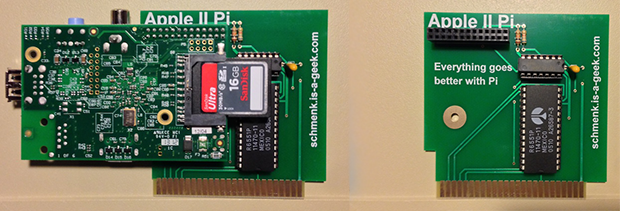
Deep in the bowels of the Internet there are some crazy people who have a wish list for what the next Apple II should look like. The capabilities of this dream machine of 80s retrocomputing is generally said to be something with a 32-bit CPU, a UNIX OS, modern graphics, and networking. This sounds a lot like a Raspberry Pi, so [Dave] built an Apple II to Raspberry Pi adapter card.
Having a Pi talk to an Apple II over a serial connection doesn’t really give either machine the full capabilities of the other. To fix this issue, [Dave] wrote two pieces of software. The first is a UNIX daemon that listens to the Apple II on a serial port connection, handling the Apple II keyboard connection. The second piece of software is a ProDOS disk image file running on the Apple II. With these two pieces of software, [Dave] can run the Apple on the Raspi, or run the Raspi on the Apple, sending files and data back and forth with no problem.
Aside from providing a strange and awesome Apple II to UNIX interface, the Apple II Pi also has a lot of advantages that might not be readily apparent. An Apple II compact flash adapter can be used as an internal hard drive for these pieces of classic apple hardware, and the Uthernet Ethernet card for the AII brings networking. Both of these devices are absurdly expensive compared to the component cost of the Apple II Pi, and what they bring to the table can be easily copied by the Apple II Pi.
The Apple II Pi is just a simple double-sided board with a few resistors, a cap, header, a 7404 inverter, and a communications chip that’s $5 for quantity one. If you already have a Raspi hanging around your workbench and want to soup up an Apple II with some crazy hardware capabilities, you really can’t do better than getting one of these Apple II Pi boards. Now if we could only find the board files…
Video of the Apple II Pi below, showing off all the awesome capabilities of a Pi-powered Apple. Thanks [Itay] for sending this one in.















Lets all be honest we do not want Unix on an Apple II. we want an AppleIIGS with a 3.5 ghz 65C816 and 8megs of static ram running at clock speed. And yes I am being silly just because. Nice hack now run an AppleII Emulator on the Pi
The video showed an Apple II emulator running on the Pi, accessing the Apple II hardware.
It had to happen, if only for the pun!
Really cool hack! It makes me want to dig up an old Apple II (err.. ][)
When can I have the same but for a Mac SE? Omg it would be awesome to slot a pi into a pds slot and get modern networking and storage on system 6 and 7.
Oh. Oh wow. Change that up with an SE/30 and you have an awesome, awesome idea.
The only problem is writing the actual drivers for the Raspi network/huge storage card. I have a ton of Apple literature on the subject, but if anyone out there has experience in writing system 7 drivers… well, Hackaday might just have to put up a bounty on this one.
Please Do!
SE, SE/30, Quadra 605, LC, whatever. Anything PDS.
I’d like to see something like this for the C64.
I’d like to see something like this for my PET.
Of course, the hack here isn’t that the A2 accesses the PI’s storage or network capabilities. Instead, the PI runs an Apple IIgs emulator which has Uthernet emulation capabilities and there is a little wrapper than runs on the 6502 in the A2 which passes the keypresses, mouse and joystick info, and drive info to the emulator.
I would have been more excited if you could directly access all the powers of the PI from inside the native A2 environment, but it would seem that’s not what is happening here.
I’ve never understood the whole retro computing movement. I grew up with those old clunkers, and I’m glad they’re gone.
Oh, well. To each his own.
1991? No, you didn’t. But thirty years from now you’ll be the guy to go, “Cool! I figured out how to send messages of only 140 characters on the Galaxy-Wide Brain Implant Network!” And we’ll understand.
Who said I was born in 1991? Do you honestly think I’m stupid enough to post my real age?
I used an Altair 8800 computer when it was brand new. You can do the math from there.
ok, DOB 1991.
The Altair 8800 came out in 1975, and I was old enough to use it at that time.
Want to try that math again?
Obviously, the brain-damage occurred in 1991…
@HomelyPoet: You are actually correct. 1991 was the year I was in a serious auto accident and received a traumatic brain injury. I have had epilepsy and migraines ever since.
The name DainBramage1991 is a tongue-in-cheek reference to that life-changing event.
Nothing has ever surpassed the game play of Star Raiders, which I still play on my original Atari 800 (serial number 0270). That’s why I keep that old clunker around. ;-)
I don’t know man… It seems to me that you’ve made the same comment on several past postings about retro computer hacks so maybe you do have a thing for retro computing after all. Me, I grew up with some of these too but more along the 6502, 1802, 6100 powered machines with very little ram. I still have a couple of my old ones. They remind me of how we used to write efficient code because we didn’t have a choice. Besides, it’s fun to flip bits, literally.
Now to make one for the PC…
Now make a NuBus version!